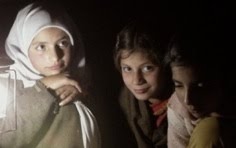 Story teaches us that the ingredients of myth and folktale hold lessons for our lives. And in some rare and beautiful cases, they can inspire us to act in ways that inextricably weave the strands of old traditional themes of heroes, journeys, love, hope, redemption and transformation into our immediate daily living.
Story teaches us that the ingredients of myth and folktale hold lessons for our lives. And in some rare and beautiful cases, they can inspire us to act in ways that inextricably weave the strands of old traditional themes of heroes, journeys, love, hope, redemption and transformation into our immediate daily living.For those whose lives are touched and blessed with Story, and who work with it extensively, often to bring healing and hope to others, it should come as no surprise to us when their lives take on the coloration of powerful mythic and symbolic narration – but all in real-time!
Laura Simms, who is a famous and loved story teller, who uses stories to promote tolerance, peace and environmental stewardship, is herself a key character in this story.
It begins at “Children’s Voices”, a UN conference in 1996, where 57 young people from 23 countries came together to discuss the challenges they faced—homelessness, child labor, prostitution and war. Ishmael Beah, from Sierra Leone, had left his country for the first time to attend this event, and something about his story deeply touched Laura Simms who was also there.
When Ishmael was 12, the civil war that had begun in his country two years previously, impacted Ishmael in a shocking, personal way. The group called the Revolutionary United Front, invaded and destroyed his home, and he lost his entire family in the ruthless attack. Then after being on the run for several months, Ishmael and many of his young friends were recruited to join government forces. They had no choice, if they refused or ran away they would be killed, so Ishmael was forced to become a child soldier. They armed him with an AK-47, got him addicted to a deadly drug, a mixture of cocaine and gun powder, and gave him a new name, Green Snake, and a new identity with it.
When she heard of haw badly the civil situation had worsened there, Laura knew she had to do all she could to bring him to the United States, a process that took more than two years, which she describes as the most demanding thing she had ever done. Yet along the way, she recalls, the people she met “were like guardians one meets on the road in a profound fairytale; the auspicious coincidence of events that mark the epics of great cultures was truly remarkable.”
Once he got to the U.S, she ‘mothered’ him, and supported him through the both the everyday changes he had to deal with and his participation in various peace conferences, even as he worked through high school and then at Oberlin College, where he gravitated toward writing, graduating as a political science major.
In A Long Way Gone: Memoirs of a Boy Soldier, described by Laura as a beautiful literary work told with the simplicity and genuineness of Ishmael's West African oral tradition, Ishmael poignantly shares stories of his youth, his indoctrination into war and his journey back to regain his humanity. The difficult story not only reveals the devastating effect on children drawn into war, but more importantly is a powerful example of inherent goodness that if uncovered and tended cannot be destroyed nor stifled.
In Laura’s own words: “What I know about storytelling is what gave me the inner courage to recognize the strength of Ishmael’s basic goodness, as something more transformative and powerful than the incident of being turned into a killer.”That process of being a storyteller, she believes, really keeps alive very important capacities one needs to envision a future, to overcome hopelessness, to have a sense to live with what’s happened in your life and go forward. It allows people to move beyond fixation on victimization.
But there is more - we live by the stories we believe, and so learning how to listen, and really understand the deeper ramifications of how a story can actually be used to separate, destroy, manipulate, or alternatively, how a story can comfort, heal and open us to true humanity is a really very important for us all.
As Laura Simms has said: ”The actual events of our lives are the greatest mythic stories. I am part of a great story, still unfolding.”
All our stories, small and big, reflect our part in the interwoven larger story. May you find ways to love the story, live the story.
Marguerite Theophil
The cure
We are often physically and mentally overwhelmed with the wordiness of the human world,
yet the cure for wordiness is not less story, but deliberate story.
~Christina Baldwin
